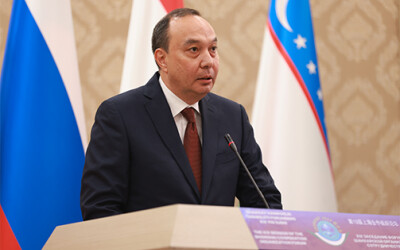Eldor Aripov: The SCO has become an integral element of the modern system of international relations
Tashkent hosts the 19th session of the Forum of the Shanghai Cooperation Organization, chaired by Uzbekistan and dedicated to “The role of the SCO in the new conditions: joining forces in the name of universal security, stability, and prosperity”.
Opening the event, the Director of the Institute for Strategic and Regional Studies under the President of the Republic of Uzbekistan, Eldor Aripov, highly appreciated the activities of the SCO. It was noted that in just over twenty years, the structure has gone through a significant path of formation and development, becoming an integral element of the modern system of international relations.
“Today, the SCO family is the world’s largest regional organization, which has united a huge geographical space and about half of the population of our planet”, the ISRS representative emphasized. “At the same time, the number of states ready to join the activities of the SCO is growing every year. And this is not surprising. The international community sees the SCO as a pole of attraction without dividing lines, capable of actively promoting a safer and more prosperous world”.
In this context, the expert focused on the success of the organization, its growing potential, and international authority, which became possible mainly due to the provision of the following essential conditions:
– First, the member countries’ strict adherence to the fundamental principles of the “Shanghai Spirit” – mutual trust, mutual benefit, equality, mutual consultation, respect for cultural diversity, and the desire for joint development.
In other words, the SCO’s activities are based on dialogue and mutual trust, while the consensus decision-making process, despite its certain complexity, remains inclusive and based on compromise.
Second, the key to the SCO’s international legal attractiveness is its non-aligned status, openness, non-direction against third countries or international organizations, equality, and respect for the sovereignty of all participants.
The above circumstances did not allow the SCO to become a club of selected large states. Still, they made it an open association, ready to interact with different countries and international organizations.
Third, Central Asia, despite the organization's expansion, has been and remains the geographical core of the SCO, an important interconnecting link between all member states that does not allow the SCO to scatter its attention and resources.
According to the ISRS representative, the SCO has remained firmly committed to these principles throughout its existence. “The latest SCO summits in Samarkand and New Delhi once again confirmed this”, he emphasized.
Moreover, Mr. Eldor Aripov added that the SCO ensures multilateral interaction in priority areas of cooperation such as transport connectivity, digitalization, industrial collaboration, and food and environmental security.

Next

Eldor Aripov, Director of the Institute for Strategic and Interregional Studies (ISMI), delivered a welcoming speech today at the XIX meeting of the Shanghai Cooperation Organization (SCO) Forum in Tashkent.
06.06.2024





